- About us
- Support the Gallery
- Venue hire
- Publications
- Research library
- Organisation chart
- Employment
- Contact us
- Make a booking
- Onsite programs
- Online programs
- School visit information
- Learning resources
- Little Darlings
- Professional learning
Archie Roach AC (1956–2022), singer/songwriter and storyteller, has been described as the voice of the Stolen Generations. A Gunditjmara and Bundjalung Elder, he was removed from his parents at age four and eventually happily settled with a couple at Lilydale, Victoria. Roach recalled being introduced to music through his adoptive father’s LP collection, and by hymns at church. His foster parents had been told that his natural family had died in a house fire, and he grew up believing this was true. But at age fifteen, he received a letter from his natural sister telling him of their mother’s death. Confused and embittered, he ran away in search of his family and spent the next fourteen years on the streets. While staying at a Salvation Army shelter in Adelaide in the early 1970s he met Ruby Hunter (1955–2010), a Ngarrindjeri woman who became his creative collaborator and life partner and with whom he had two sons. In 1987, having experienced homelessness and overcome alcoholism, he wrote his first song, ‘Took the Children Away’. He performed it for the first time amidst the protests at the bicentenary celebrations in 1988; his performance, to a mainly white audience, was met with stunned silence. Paul Kelly invited him to open a concert in early 1989, and Kelly co-produced Roach's first album, Charcoal Lane (1990), which was on US Rolling Stone's list of Top 50 albums for 1992, achieved gold sales in Australia, and earned Roach two ARIAs and a human rights award. In all, Roach recorded ten studio albums, including Into the Bloodstream (2012) and Let Love Rule (2016). His ninth album Tell Me Why (2019) won two ARIAs and was released in accompaniment to Roach’s memoir of the same name, for which he won the Victorian Premier's Literary Award for Indigenous Writing. Both solo and with Hunter, Roach recorded and performed with many top Australian and international acts, and a subsequent generation of First Nations musicians and performers have cited Roach and Hunter as inspiring influences on their own lives and work. ‘Took the Children Away’ was added to the National Film and Sound Archive’s Sounds of Australia register in 2013 and it was among the songs Roach re-recorded for The Songs of Charcoal Lane in 2020, when he was also inducted into the ARIA Hall of Fame.
Purchased 2010
© Bill McAuley
This portrait of the singer songwriter Archie Roach was made in 1992 by Bill McAuley. It is a large black and white type C photograph measuring 41 cm by 28 cm in a modest wooden frame.
Archie’s face takes up almost all the photograph. His head is tilted to his left against a deep black background. Archie is wearing a wide ribbed knitted beanie pushed down low on his brow. The beanie is striped horizontally, dark at the top with a wide mid- tone band, a narrow dark band and finishing with a white edging, just above his eyebrows.
Archie has full eyebrows, wide-set dark eyes with shadows and several lines arched below them. He is looking steadily off to his right. Archie has a broad nose with lines extending either side defining his cheeks. Light shines onto his face from the right, washing over his cheek and along the ridge of his nose. Shadow darkens his right cheek which blends into the dark background.
His lips are full. The upper lip is dark and well defined, the lower lip softly lit. A deep shadow below his lips and above his chin merges into the dark background. This is in sharp contrast to the light on his face which forms an inverted triangle from the white band of the beanie to his chin at the lower edge of the image.
Audio description written by Krysia Kitch and voiced by Alana Sivell, 2021



On one level The Companion talks about the most famous and frontline Australians, but on another it tells us about ourselves.
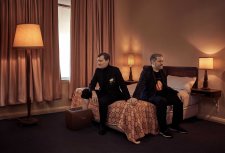
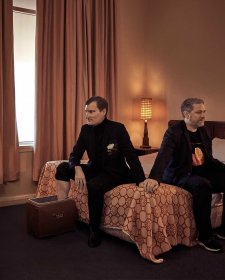
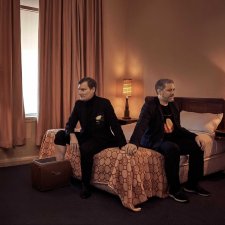
Sandra Bruce gazes on love and the portrait through Australian Love Stories’ multi-faceted prism.
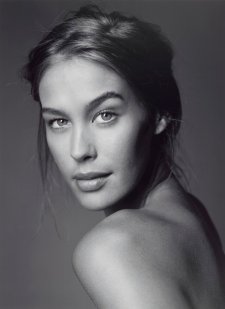
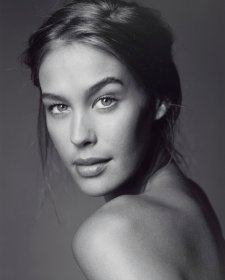
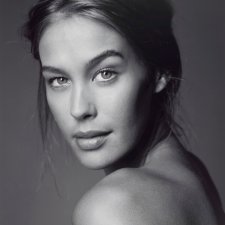
Christopher Chapman examines the battle of glamour vs. grunge which played out in the fashion and advertising of the 1990s.